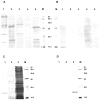Elevated systemic antibodies towards commensal gut microbiota in autoinflammatory condition
- PMID: 18779861
- PMCID: PMC2525839
- DOI: 10.1371/journal.pone.0003172
Elevated systemic antibodies towards commensal gut microbiota in autoinflammatory condition
Abstract
Background: Familial Mediterranean fever (FMF) is an autoinflammatory condition, which is characterized by acute, self-limiting episodes of fever and serositis and chronic subclinical inflammation in remission. Here we investigated the consequence of this condition on the level of systemic antibodies directed towards common intestinal bacteria.
Methodology/principal findings: The level of systemic antibodies towards the antigens of Bacteroides, Parabacteroides, Escherichia, Enteroccocus and Lactobaccilus was measured by ELISA in FMF patients at various stages of the disease and in healthy controls. The difference between remission and attack was not significant. IgG antibodies against the antigens of Bacteroides, Parabacteroides, Escherichia and Enteroccocus were significantly increased in FMF compared to control while IgA levels were not significantly affected. Western blot analyses demonstrated the IgG reactivity against multiple antigens of commensal bacteria in FMF. Serological expression cloning was performed to identify these antigens. No single dominant antigen was identified; the response was generalized and directed against a variety of proteins from Bacteroides, Parabacteroides, Escherichia, and other gut commensals.
Conclusions/significance: This autoinflammatory syndrome is characterized by the increased systemic reactivity against commensal gut microbiota. This is probably the consequence of hypersensitivity of the inflammasome in FMF that triggers the inflammation and contributes to the excessive translocation of bacteria and bacterial antigens through the gut barrier.
Conflict of interest statement
Figures

Similar articles
-
Lactobacillus acidophilus INMIA 9602 Er-2 strain 317/402 probiotic regulates growth of commensal Escherichia coli in gut microbiota of familial Mediterranean fever disease subjects.Lett Appl Microbiol. 2017 Apr;64(4):254-260. doi: 10.1111/lam.12722. Epub 2017 Feb 27. Lett Appl Microbiol. 2017. PMID: 28140472
-
Predominant role of host genetics in controlling the composition of gut microbiota.PLoS One. 2008 Aug 26;3(8):e3064. doi: 10.1371/journal.pone.0003064. PLoS One. 2008. PMID: 18725973 Free PMC article.
-
Serum adenosine deaminase activities during acute attacks and attack-free periods of familial Mediterranean fever.Eur J Intern Med. 2009 Jan;20(1):44-7. doi: 10.1016/j.ejim.2008.04.020. Epub 2008 Jun 20. Eur J Intern Med. 2009. PMID: 19237091
-
Autoinflammation: Lessons from the study of familial Mediterranean fever.J Autoimmun. 2019 Nov;104:102305. doi: 10.1016/j.jaut.2019.102305. Epub 2019 Jul 20. J Autoimmun. 2019. PMID: 31337526 Review.
-
Autoinflammatory syndromes and infections: pathogenetic and clinical implications.Clin Exp Rheumatol. 2008 Jan-Feb;26(1 Suppl 48):S53-61. Clin Exp Rheumatol. 2008. PMID: 18570755 Review.
Cited by
-
The Role of Notch Signaling and Gut Microbiota in Autoinflammatory Diseases: Mechanisms and Future Views.Biomedicines. 2025 Mar 21;13(4):768. doi: 10.3390/biomedicines13040768. Biomedicines. 2025. PMID: 40299348 Free PMC article. Review.
-
Systemic Concentrations of Short Chain Fatty Acids Are Elevated in Salmonellosis and Exacerbation of Familial Mediterranean Fever.Front Microbiol. 2016 May 24;7:776. doi: 10.3389/fmicb.2016.00776. eCollection 2016. Front Microbiol. 2016. PMID: 27252692 Free PMC article.
-
Management of familial Mediterranean fever by colchicine does not normalize the altered profile of microbial long chain fatty acids in the human metabolome.Front Cell Infect Microbiol. 2013 Jan 28;3:2. doi: 10.3389/fcimb.2013.00002. eCollection 2013. Front Cell Infect Microbiol. 2013. PMID: 23373011 Free PMC article.
-
Association Between Gut Microbiota and Autoimmune Thyroid Disease: A Systematic Review and Meta-Analysis.Front Endocrinol (Lausanne). 2021 Nov 17;12:774362. doi: 10.3389/fendo.2021.774362. eCollection 2021. Front Endocrinol (Lausanne). 2021. PMID: 34867823 Free PMC article.
-
Probiotic Therapy During Vaccination Alters Antibody Response to Simian-Human Immunodeficiency Virus Infection But Not to Commensals.AIDS Res Hum Retroviruses. 2023 May;39(5):222-231. doi: 10.1089/AID.2022.0123. Epub 2023 Feb 3. AIDS Res Hum Retroviruses. 2023. PMID: 36517984 Free PMC article.
References
-
- Ting JP, Kastner DL, Hoffman HM. CATERPILLERs, pyrin and hereditary immunological disorders. Nat Rev Immunol. 2006;6:183–195. - PubMed
-
- Centola M, Wood G, Frucht DM, Galon J, Aringer M, et al. The gene for familial Mediterranean fever, MEFV, is expressed in early leukocyte development and is regulated in response to inflammatory mediators. Blood. 2000;95:3223–3231. - PubMed
-
- Diaz A, Hu C, Kastner DL, Schaner P, Reginato AM, et al. Lipopolysaccharide-induced expression of multiple alternatively spliced MEFV transcripts in human synovial fibroblasts: a prominent splice isoform lacks the C-terminal domain that is highly mutated in familial Mediterranean fever. Arthritis Rheum. 2004;50:3679–3689. - PubMed
-
- The International FMF Consortium. Ancient missense mutations in a new member of the RoRet gene family are likely to cause familial Mediterranean fever. Cell. 1997;90:797–807. - PubMed
-
- The French FMF Consortium. A candidate gene for familial Mediterranean fever. Nat Genet. 1997;17:25–31. - PubMed
Publication types
MeSH terms
Substances
LinkOut - more resources
Full Text Sources
Other Literature Sources
Molecular Biology Databases
Miscellaneous

